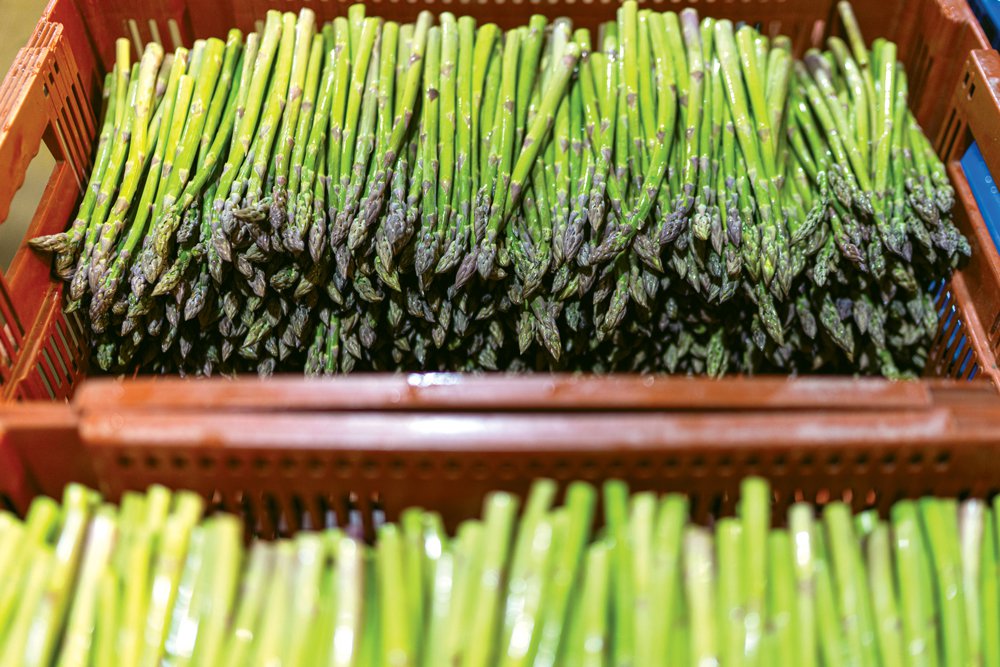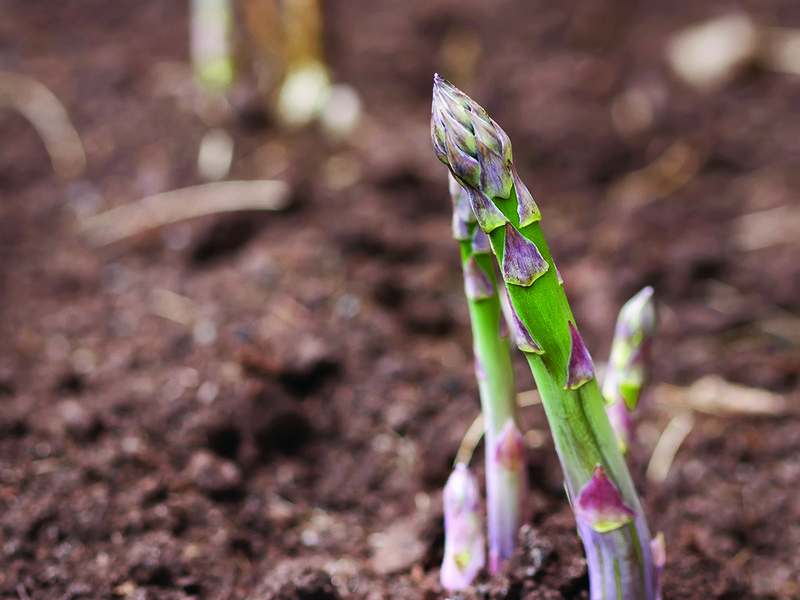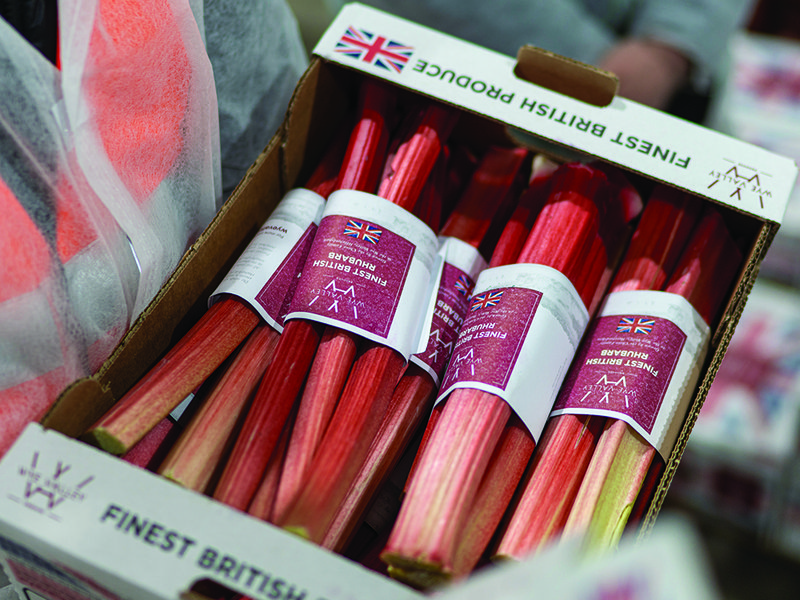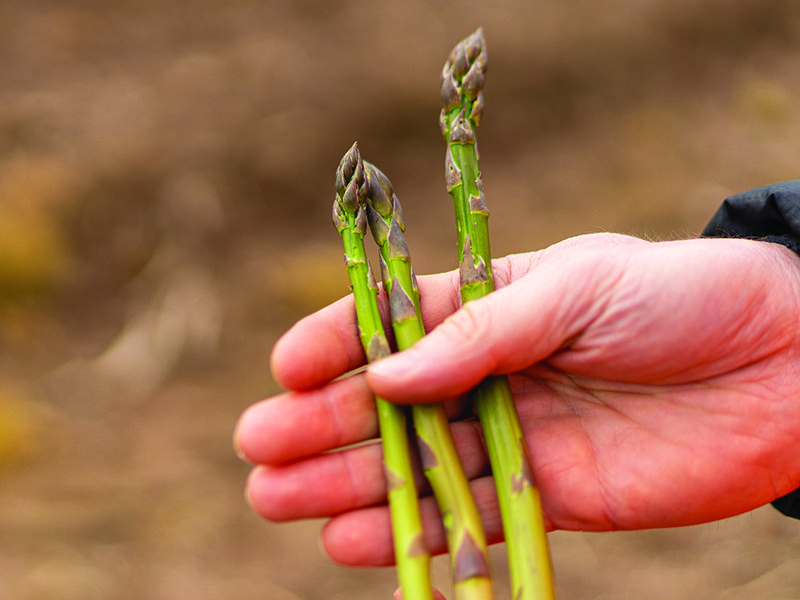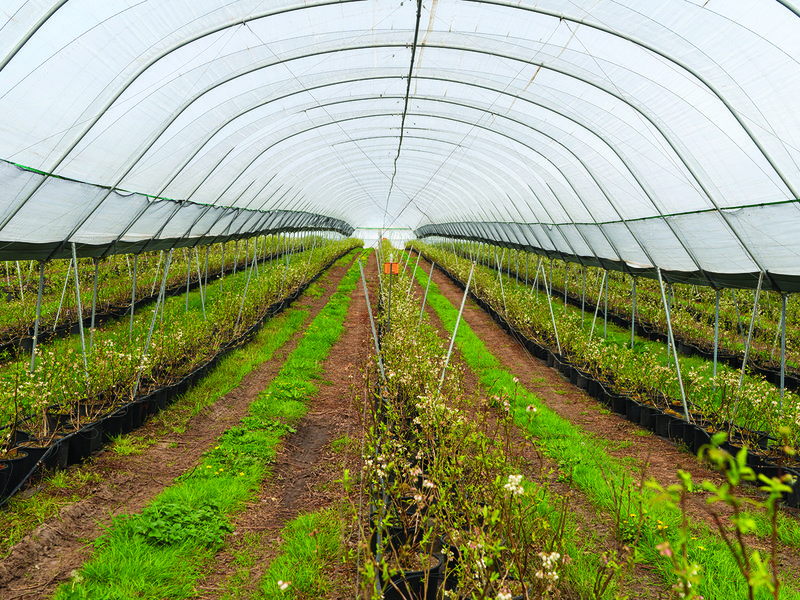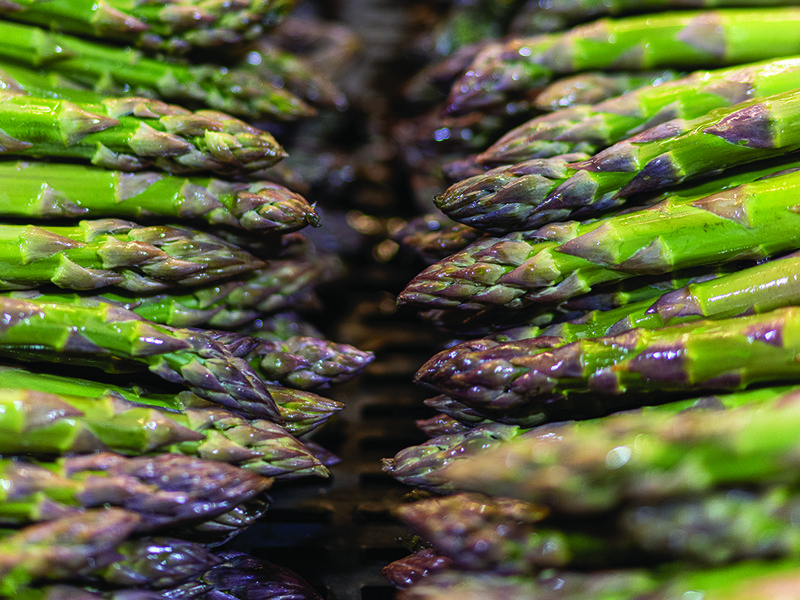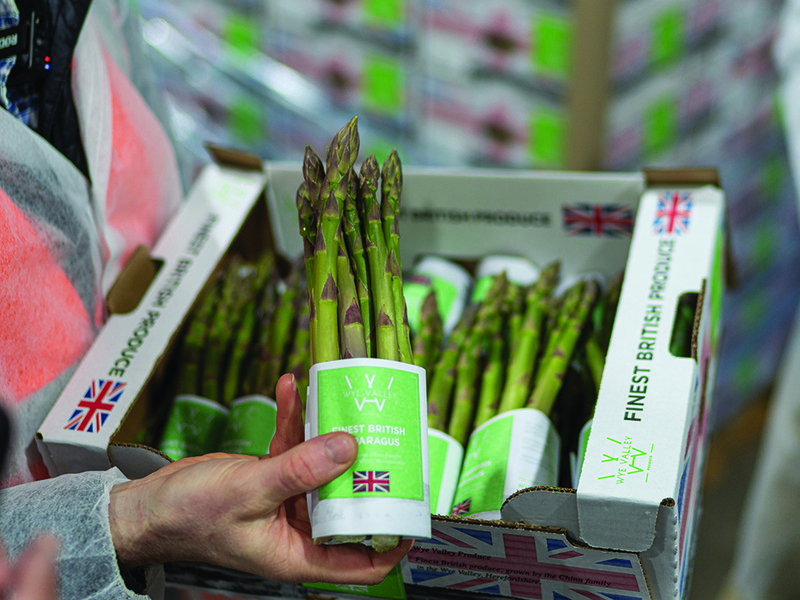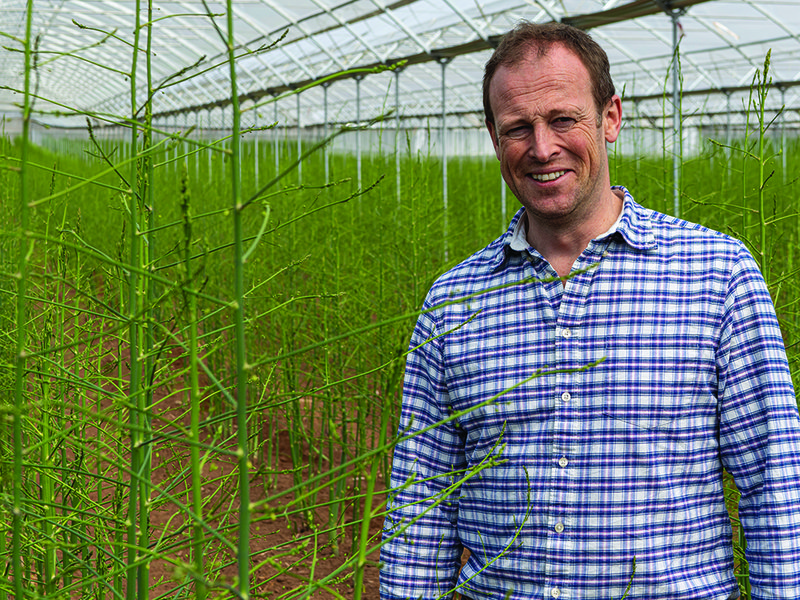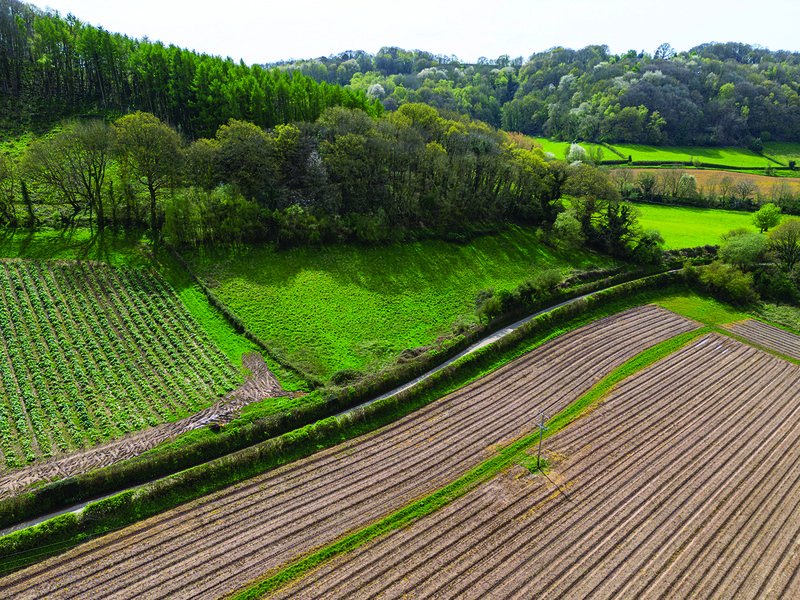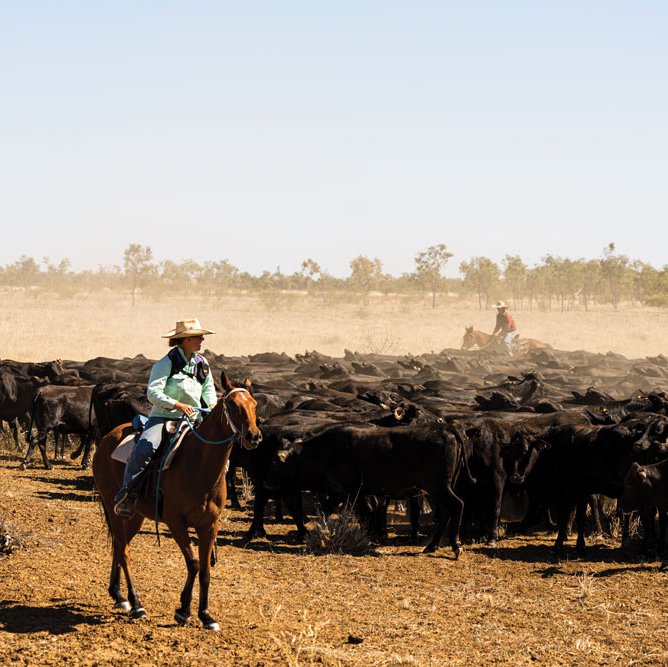At the time of our visit, it is almost St George’s Day in the Wye Valley, Herefordshire, where fields of asparagus await the feast of England’s dragon-slaying patron saint on 23 April – the official start date of the growing season. “It’s a unique crop, a very unusual vegetable,” says Chris Chinn at Cobrey Farms, which his family founded four generations back.
“We’ve been here a century now, since 1924,” he says, while his brother Henry drives noisily by on the same vintage Ford tractor that he first learned to drive on. “We still need to work out how we’re going to celebrate.” Chris walks and talks us along the bushy green borders where green asparagus spears have been allowed to grow out into their full, natural, fernlike selves.
He explains how each one begins in hidden networks of root mass and bud clusters, buried about six centimetres below the soil. The tips start to emerge at this time of year, “as the first spring warmth gets to them”. Seven to 10 of those will soon be harvested from every plant, leaving roughly the same number behind, before the cutting then stops quite abruptly on Midsummer’s day, 21 June. “We can’t just keep harvesting all summer,” says Chris.
“We need to leave plenty in the ground to keep charging the root system over the winter. So that’s why we’ve got such a short season. When it’s gone, it’s gone.” The green asparagus, he says, is the type “we know and love as an English-speaking nation”, and he’s so primed for the coming crop as to manifest a real farmer’s pride overlooking the field. “Exciting, isn’t it? A real seasonal treat.”
White asparagus, meanwhile, never gets the sun and so never loses its subterranean pallor. The purple kind, meanwhile, is purpose-bred for its pretty colour, tender texture and sweeter flavour. “It’s so good for salads,” says Chris. Both varieties have even shorter growing seasons than classic green, but the Chinn family business, Wye Valley Produce, has become “quite well known” for all three, as Chris puts it – a modest way of saying they’re renowned, in fact, for their quality and consistency – despite only producing them since 2004. In previous decades, much of their land was given over to growing new potatoes, but the farm suffered a large fire in 2002.
“Out of the ashes emerged this idea for a new crop. South Herefordshire is a big area for soft fruit-growing, but we didn’t want to be the same as everyone else. Asparagus seemed to need some development, having been grown at small scale, in the same traditional manner, for 50 or 100 years.”
The Wye Valley has since proven optimal for this vegetable, too, in its particular confluence of climate, landscape and soil type. Wine-growers call it “terroir”, a term that Chris says has much more direct impact on produce like asparagus.
“Our position is fortunate in that we get the prevailing South-Westerly winds and the mid-Atlantic current, which bring heat from the Caribbean and carry lots of rain, some of which is dropped on Wales before it reaches us. All of which makes our winters not too cold and our spring relatively warm, while the local topography is useful in angling our fields into the sun on the south-facing slopes, and away from the sun on the north-facing slopes.”
Exploiting those angles with judiciously placed polythene tunnels can help extend the season a little at either end, and beyond the growing itself the product is also graded and packed on-site before shipping out to clients like Spinneys. “We do all of that here and we love it. We’re in total control of the whole process and the asparagus leaves our farm with our name on the pack. It’s fantastic.” The current Wye Valley range also runs to many other soft fruits and vegetables, including the fresh rhubarb up on the north slope that is also shipped to Spinneys, and the sweet summer blueberries that soon will be.
Finding regional growers like Chris Chinn to supply unusual and/or niche short-season produce is important to Spinneys, and we have access to such producers in the UK through a highly specialised intermediary that is Mudwalls Food Group.
Founded by George Beach in 2010, the Mudwalls Fresh Produce brand exists to promote those growers – to make them feel “more relevant” in retail, as George has put it himself. “My ambition was to pass on to the customer the honest provenance that we’re all aware of but sometimes seem to shy away from.” The Chinns of Cobrey Farms duly supply the asparagus that has become a kind of icon of English agriculture, with every shipment a delivery on that Mudwalls Fresh Produce promise.
Here at Spinneys, our in-house produce commercial manager Neil Gibson is bound to agree that “these home-grown British varieties taste best.”
“Just in terms of their quality and consistency, their richer depth of flavour, the way they hold their texture in cooking.”
And when it comes to the age-old question of whether to bend or snap the spears first, Chris Chinn thinks it’s best to simply trim off the whiter sections, as they’re likely to be toughest. All asparagus can be eaten raw, he reminds us, and cooking only softens it up. Nutritious as it is, he says that he eats “an unhealthy amount of asparagus”, working so close to home that he’ll often fry some up for his lunchtime bap.
“Sometimes it’s just easier to boil it, as I quite often do myself, but to get more flavour you can grill it, barbecue it, braai it. Or just get a tray, bake it off, perhaps a bit of parmesan on top, and have it as a starter or a sharing dish. You can’t do that with many other veg.”

Produce commercial manager
Neil Gibson says
At Spinneys we are always looking for seasonal products that are unique or unusual. Mudwalls is great at finding specialist growers that are scattered across the British Isles for us. Asparagus is a fantastic superfood and I am excited to be able to make Chris Chinn’s green, purple and white varieties accessible to our customers. Cobrey Farms in the Wye Valley is set in an area of outstanding natural beauty and the terroir is wonderful for growing great tasting, quality produce.
